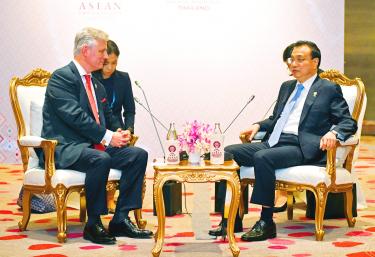The US on Monday accused China of intimidation in the South China Sea as it put forward its strongest language yet rejecting Beijing’s claims to the strategic, dispute-rife waters.
The Pacific powers traded tit-for-tat barbs over the South China Sea at a regional summit in Bangkok, with Beijing accusing Washington of ratcheting up tensions in the waters, a key global shipping route.
Beijing claims huge swathes of the sea, where it is accused of building military installations and fake islands — and ramming fishing vessels.
US National Security Adviser Robert O’Brien highlighted the right of freedom of navigation as he led Washington’s delegation to the ASEAN summit and parallel East Asia Summit.
“Beijing has used intimidation to try and stop ASEAN nations from exploiting their offshore resources,” he said, addressing an ASEAN meeting on Monday.
“Big countries should not bully other countries,” he later told reporters.
As the summit was wrapping up, the US Department of State released a report on its Asia-Pacific strategy with unusually strong language denouncing China’s basis for its claims — the so-called “nine-dash line.”
Beijing’s “maritime claims in the South China Sea, exemplified by the preposterous ‘nine-dash line,’ are unfounded, unlawful and unreasonable,” the report said.
US leaders have been taking an increasingly sharp tone on China, but have generally focused on encouraging all claimants to resolve disputes peacefully, rather than Washington taking a position itself.
Beijing claims the majority of the South China Sea through the “nine-dash line,” a vague delineation based on maps from the 1940s.
Taiwan, Vietnam, the Philippines, Malaysia and Brunei all have rival claims to all or parts of the South China Sea.
Asked about the US’ comments at the ASEAN summit, Chinese Vice Minister of Foreign Affairs Le Yucheng (樂玉成) accused some outside countries of “meddling” in the sea.
“Some non-regional countries cannot live with calm waters in the South China Sea and have come all this way to make waves,” Le said, in an apparent jab at the US.
In return, O’Brien later said that “we don’t think we’re meddlers.”
“We always come when we’re invited, unlike other countries,” he said after Le’s comments emerged.
Despite the strong language from the US in the report, some observers questioned its level of commitment.
O’Brien was the lowest-ranking official ever sent by the US to an East Asia Summit since Washington successfully won an annual invitation in 2011.
The summits are usually attended by heads of state, but a US official said that US President Donald Trump — who on Saturday watched a mixed martial arts championship in his home city of New York — was busy with campaign events.
However, the report said that the US was stepping up its engagement with key partners in Asia, including India and allies Japan and South Korea.
“We are committed to upholding a free and open Indo-Pacific in which all nations, large and small, are secure in their sovereignty and able to pursue economic growth consistent with international law and principles of fair competition,” the report said.
Source: Taipei Times - 2019/11/06





















